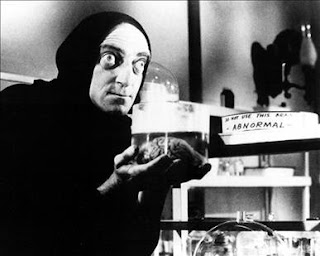I have swiped another excellent post from today’s Beyond Meds in order to make a schizophrenia related point. That point is about how psychiatry tries to scare us (patients/families) into medication compliance by telling us that “untreated” schizophrenia, meaning in pharma-speak, pharma treated mental illness, leads to brain damage. Never mind the fact that there is no sign of brain damage in the untreated schizophrenic brain on the autopsy table, as psychiatrist Thomas Szasz insists there should be in order to show damage.
Beyond Meds guest blogger Alto Strata, in her blog post entitled Neuropsychiatry: Same baloney, different sandwich, writes
And there has to be some stick to use to drive them to drugs, so psychiatry has enthusiastically taken up the cudgel of depression as progressive brain damage.
The progressive brain damage trope doesn’t fly — clearly many people recover from “depression” and other mood disorders without drugs and seem to be as good as anyone else.
It is an absurdity and an offense to humanity to argue, for example, that 2 weeks of grieving, which can be diagnosed as major depression, becomes brain damage if allowed to continue longer. In general, the brains of “depressed” people, even ridden with all those diseased circuits, work fine. Many are even intellectual leaders and creative geniuses.
Imagine, you are like me, a vulnerable parent, arriving at the emergency entrance of the hospital with your “loved one” in tow. You are panic stricken. Your “loved one” sure is acting weird, no doubt about it, and this is the perfect opportunity for the doctors to spring upon you the news that, without medications, your relative’s brain is going to look like Swiss cheese. You don’t need much convincing that there is something definitely wrong with his or her brain, because he/she sure is acting strangely, and you cling to the drugs like a shipwrecked sailor to a life raft. You think you’re being responsible, and you are, based on the information that you’ve just been given. Unfortunately, it’s false information. Remember, schizophrenia is not seen on the autopsy table, nobody has discovered a gene for it, and it is repeatedly alleged that neuro-imaging anomalies are often due to the effects of medication.
Back in Dec. 2003, the intake psychiatrists at the Centre for Addictions and Mental Health (CAMH) in Toronto had either never heard of neuroplasticity, or else they were trying not to let the latest research escape into the hands of the general population until they got the new story line straight. The doctors told my husband and me in all earnestness that my son’s brain was going to slowly solidify like drying concrete (new word “neuroconcretivity” LOL) if he didn’t get on those drugs toute de suite. That was only in 2003. Then, suddenly, around 2005, I would say, we start hearing that the brain has endless capacity to reinvent itself, busily erecting new turnpikes in the neuronal information highway. The brain was now plastic.
Is being plastic good or bad? I dunno, it initially sounded to me like good news, but the pharmaceutical companies are dealing with the new findings like it’s business as usual: “The brain needs to be protected from progressive brain damage.”
Damage caused by what, exactly? The fact that neurons may have taken a detour around the diagnosis? The damage in lost revenue, perhaps?
